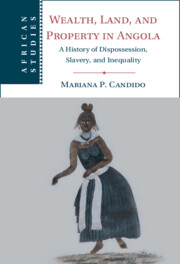Book contents
- Wealth, Land, and Property in Angola
- African Studies Series
- Wealth, Land, and Property in Angola
- Copyright page
- Contents
- Maps and Plans
- Illustrations
- Tables and Graphs
- Acknowledgments
- A Note on Currency and Price-Level Adjustments
- Introduction
- 1 Who Owned What?
- 2 Property Rights in the Nineteenth Century
- 3 Written Records and Gendered Strategies to Secure Property
- 4 Commodification of Human Beings
- 5 Branded in Freedom
- 6 The Erasure of Communal Rights
- 7 Global Consumers: West Central Africans and the Accumulation of Things
- Conclusion
- Bibliography
- Index
- African Studies Series
7 - Global Consumers: West Central Africans and the Accumulation of Things
Published online by Cambridge University Press: 22 September 2022
- Wealth, Land, and Property in Angola
- African Studies Series
- Wealth, Land, and Property in Angola
- Copyright page
- Contents
- Maps and Plans
- Illustrations
- Tables and Graphs
- Acknowledgments
- A Note on Currency and Price-Level Adjustments
- Introduction
- 1 Who Owned What?
- 2 Property Rights in the Nineteenth Century
- 3 Written Records and Gendered Strategies to Secure Property
- 4 Commodification of Human Beings
- 5 Branded in Freedom
- 6 The Erasure of Communal Rights
- 7 Global Consumers: West Central Africans and the Accumulation of Things
- Conclusion
- Bibliography
- Index
- African Studies Series
Summary
Chapter 7 focuses on the process that transformed West Central Africans from forced laborers into consumers of products manufactured elsewhere. The expansion of the colonial bureaucracy reveals the items West Central Africans collected during their lifetimes and the emotional and financial value associated with material culture. Their consumption patterns make it possible to explore the movement of goods, the role of commercial centers, and the changes in taste and fashion. Africans imported items that favored European industries at the expense of their local production, a clear demonstration of how colonial power, dispossession, and dependency have a long history and predate the twentieth century. Rulers and commoners desired material things beyond their basic needs and aspired to buy and collect a variety of goods. They consumed items that connected them to societies around the world and encouraged African political elites and warlords to engage in warfare and other strategies to enslave enemies, exacerbating violence, dispossession, and displacement. The expansion of the colonial bureaucracy reveals that African women not only acquired imported goods and transmitted them to loved ones but also made constant efforts to protect the assets they had accumulated during their lives.
- Type
- Chapter
- Information
- Wealth, Land, and Property in AngolaA History of Dispossession, Slavery, and Inequality, pp. 231 - 273Publisher: Cambridge University PressPrint publication year: 2022

